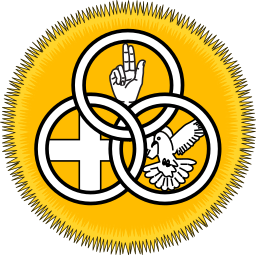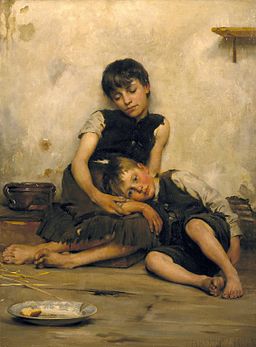Sermon delivered at Lutheran Church of the Cross in Berkeley.
June 11 – Holy Trinity Sunday
“Good enough”. Text is from Matthew 28:16-20
Sermon audio follows:
Good morning to you my sisters and brothers in Christ, saints and sinners, children of God.
 Do you ever think that you’re not good enough for the gospel? Do you ever think that something that you’ve got inside of you, maybe a yearning doubt or maybe that your faith isn’t strong enough, or maybe you’ve done so much in your life that you don’t think there’s a chance in the world that you would feel the call of God to do the work that he calls you to do in the world.
Do you ever think that you’re not good enough for the gospel? Do you ever think that something that you’ve got inside of you, maybe a yearning doubt or maybe that your faith isn’t strong enough, or maybe you’ve done so much in your life that you don’t think there’s a chance in the world that you would feel the call of God to do the work that he calls you to do in the world.
Sisters and brothers, this is not an unfamiliar feeling, even to those of us who are seemingly the ones to whom God has issued a call to discipleship, whether they be pastors, deacons, leaders of the church, or other types of ministry. I know that I’ve experienced many doubts in my lifetime, unable to be certain of whether I was good enough to share the good news, or even worthy enough to earn the merit of salvation. They can be some hard feelings to overcome.
And so many of us linger, unsure of where the spirit is moving us, how the spirit is driving us. Determined that while our soul is being fed on Sunday morning, the task of discipleship is best left to others, those that are truly meritorious of this, the final commission that Jesus Christ sent his disciples out on the final days he was in the world.
But we have the love of God within us. And we have the peace that Christ offers us. And through the communion of the Holy Spirit, we are compelled to act in ways that are contrary to often selfish human nature. God calls us into discipleship. And in the words of Christ, it doesn’t matter whether or not we believe strongly enough or behave righteously enough. He sent all of his disciples into the world to do the work, as we read at the end of Matthew.
The final commission completes the Gospel of Matthew, and takes place not long after Jesus has risen from the dead. All of the disciples return to their homeland, in Galilee, where Jesus appears to them all at the same time time (at least in the Gospel of Matthew). The end of the Gospel of Matthew is the beginning of the work of Christ in the world.
Jesus’ place here is no doubt. This dialogue takes place after all the miracles he has performed. All the prophecies he has fulfilled. This happens beyond the Last Supper, the betrayal, suffering, crucifixion and death. We have witnessed the empty tomb, and Christ has appeared to the women, Peter, John, the rest of therm. There is no question that Christ is Lord and that his divinity is from God’s own self.
And so the command that Jesus gives the disciples, to go out into the world and make other disciples, stems from that divine authority, directly from God. To baptize them in the triune name of Father, Son and Holy Spirit. The same authority that Jesus had to forgive sins, that the Pharisees called blasphemy. Jesus is telling his followers to baptize in his name. In the name of the Father. And in the name of the Son. And in the name of the Holy Spirit. Jesus is God. End of question. And he has given this special commission to each and every one of them.
And so, when we read what Matthew tells us in verse 17: “When they saw him, they worshiped him; but some doubted.” My mind simply boggles. After all this time, after following Jesus, after seeing him appear to them already several time and after listening to the testimony of others, some of these people continue to doubt. Some of these human, frail, imperfect human beings doubted that what they were witnessing was, in fact, the return of their teacher, their friend. Despite all the evidence.
But that’s not what really throws me.
Because despite that doubt. Despite that disbelief, Jesus still sent them out to make disciples. Yes, you who doubt me, go and make disciples of humankind. You who resist the faith that I have entrusted to you, yes, you over there, you are yet qualified to baptize in my name, in the name of God the Father, in the name of God the Son, and in the name of God the Holy Spirit, make disciples, and tell them to obey all the commandments that I have given you. Love each other as I have loved you. Love God with everything you’ve got. Love your neighbors like you would yourself, and I don’t mean the way you fail to love yourself when you harm yourself but the way you’re intended to love yourself to preserve yourself and make yourself feel good. Yes, do that with your neighbors too.
This I tell you to do everywhere in the world you may go.
These are God’s commandments that Jesus tells them to do, but in the resurrection, they are not simply God’s commandments, they come from Jesus too. And he has the strength and power to instruct anyone to share the good news of his new covenant with mankind. Even those who doubt. Even those who are less than perfect.
And so we can doubt. And if you realized this was Holy Trinity Sunday and was hoping for a sermon whereby the pastor explained the hypostatic nature of the Holy Trinity, you’ll be sorely disappointed. Because I can’t even say I completely understand it. I know and declare that God is the Creator and Jesus is God and God, the Holy Spirit directs us in our day to day activities. That God, the Parent made us and loves us and that God the Son and the Word gave his life for us and rules over us and God the Holy Spirit breathes in us and enables us to live righteously and love each other. And we don’t need to understand the nature of the Trinity to be God’s wonderful servants, to be disciples.
We don’t need to lead perfect lives and we don’t need to be exemplars of faith, and we don’t need to worry about all of our past deeds. Faith is a journey and we journey together.
If we want to lead more holy lives, we can take a loo at what it means to declare everything that we do, “In the name of the Father, and of the Son, and of the Holy Spirit.” What would it look like if all of our efforts were done with the understanding that right there, in the room with us, were the Father, and the Son, and the Holy Spirit. That all the promises that they entailed, all of the meaning that went with them. How we behave and how we experience each moment. Every meeting, every dinner, every car wash, in the triune name of God the Father, God the Son, and God the Holy Spirit. Any fear we have will be assuaged. Any doubt we experienced is relieved.
Sisters and brothers, the doubt that we sometimes fear is not somehow telling us that our faith has failed or that we are somehow unworthy of God. It is telling us that we are human, and therefore absolutely loved by God, and as Jesus has called us to act as disciples, and given us authority to do great things in his name, having doubts doesn’t discount that. Being imperfect simply reminds us that we need God to complete us, because in no way are we able to have the strength on our own, and God is always there to do that.
God loves us, just as we are. Jesus calls us into mission, no matter how we believe. The Holy Spirit moves us forward, whether we’re ready or not. And the good news is that we never have to doubt. We never have to fear. Because God the Father, the Son and the Holy Spirit is with us, from beginning to end.
Amen






